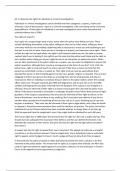AC 1.4 Examine the rights of individuals in criminal investigations
Individuals in criminal investigations can be divided into three categories: suspects, victims and
witnesses. Each of these posses’ rights in a criminal investigation, with some being similar and some
being different. All the rights of individuals in criminal investigations come under the police and
criminal evidence Act of 1984.
The rights of suspects:
Your rights of a suspect begin early as your arrest when the police must follow set rules. These
include identifying themselves as the police, telling you that you’re under arrest, telling you what
crime they think you’ve committed, explaining why its necessary to arrest you and explaining to you
that you’re not free to leave. Once you are in custody as a suspect, you have even more rights. These
include the right to free legal advice, the right to tell someone where you are, the right to receive
medical help if you’re feeling ill, the right to see the rules that the police must follow and the right to
see a written notice telling you of your rights/access to an interpreter to explain the notice. When
you are later questioned at the police station as a suspect, you are under no obligation to answer the
police’s questions, although there may be a consequence in the future if you don’t. First of all, the
police have a right to stop and search or arrest a person if they have a reason to think that this
person has committed a crime or is about to. Their right to do so must be used without them
abusing their power or discriminating against certain race, gender, religion or sexuality. They are also
obligated to inform that person that they are arresting them and on what grounds and why it is
necessary to. After an individual is arrested, they are taken to the police station, where the custody
officer takes over. They get searched, give DNA and fingerprints and are put into a cell. The DNA
samples and fingerprints should be removed from the database if thr suspect is not charged or is
released. They are informed of their right to a lawyer and are given the rules that the police must
follow. If the person arrested is vulnerable or underage, the police must inform their parents or legal
guardians. If the suspect is questioned, they must also be informed of their right to silence, in the
form of the phrases ‘you do not have to say anything. But it may harm your defence if you do not
mention when questioned of something which you later rely on in court. Anything you do say may
be given in evidence’. They must also be informed of their right to legal advice, and if they do decide
to request it, the police cannot question them until the solicitors are present. The police can hold an
individual for up to 24 hours before they have to decide whether to charge them or let them go.
With the approval from the magistrate’s court, they might hold an individual for up to 96 hours.
The human rights Act of 1998 states that everyone has the right to a fair trial, a public hearing. They
should also have adequate time to prepare their defence and they can defend themselves or be
defended by a solicitor of their choice. Everyone also has the right to free legal advice provided if
they need it.
A suspect also has the right to appeal their case if convicted. This appeal can either be a wrongful
conviction or on the sentence passed. If tried in magistrates’ court, defendants have an automatic
right to appeal, while if judged in Crown’s Court a judge will have to allow them time to appeal.
In the briefcase, the police arrested Jim Allen but failed to provide him with a solicitor in his first
interview at the police station. This means that his rights as a suspect were violated. Jim Allen also
used his right and wished to appeal against his conviction, however, his trial took place in Crown’s
Court, so the appeal has to be approved by a judge first.





